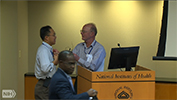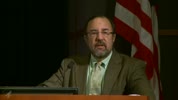-
- NIH VideoCast - Health in Building Roundtable Conference
-
- - Division of Environmental Protection, NIH (2015/12/03)
- - Category : Conferences
- This one-day conference, sponsored by the NIH Health in Buildings Roundtable (HiBR), will highlight how research teams are establishing a new knowledge base using wearable and portable devices to assess health outcomes linked to environmental experience. The results of these projects are producing new policy and practices that promote wellness, including enhanced movement, healthy stress outcomes, improved circadian stimulation, and reduction in respiratory illness. The conference will explore issues and challenges of translating complex research findings into design, behavioral guidance, and building operational practices.
For more information go to http://nems.nih.gov/teams/Pages/Health-in-Buildings-Roundtable.aspx
NIH VideoCast - Health in Building Roundtable Conference
-
- NIH VideoCast - Joint Meeting of the NCI Board of Scientific Advisors and the National Cancer Advisory Board - December 2015
-
- - NCI, NIH (2015/12/03)
- - Category : National Cancer Advisory Board
- 6th Joint Meeting of the NCI Board of Scientific Advisors and the National Cancer Advisory Board
NIH VideoCast - Joint Meeting of the NCI Board of Scientific Advisors and the National Cancer Advisory Board - December 2015
-
- NIH VideoCast - Introduction to the Principles and Practice of Clinical Research (IPPCR): Designing and Testing Questionnaires
-
- - Barbara Stussman, B.A., NIH (2015/12/03)
- - Category : IPPCR
- The Introduction to the Principles and Practice of Clinical Research (IPPCR) is a course to train participants on how to effectively conduct clinical research. The course focuses on the spectrum of clinical research and the research process by highlighting epidemiologic methods, study design, protocol preparation, patient monitoring, quality assurance, and Food and Drug Administration (FDA) issues.
For more information go to https://ippcr.nihtraining.com/login.php
NIH VideoCast - Introduction to the Principles and Practice of Clinical Research (IPPCR): Designing and Testing Questionnaires
-
- NIH VideoCast - TRACO 2015: Nanotechnology - Pancreatic Cancer
-
- - M. Dobrovolskaia, NIH; P. Hussain, NIH (2015/12/02)
- - Category : TRACO
- Nanotechnology; Pancreatic cancer
For more information go to http://ccr.cancer.gov//trainee-resources-courses-workshops-traco
NIH VideoCast - TRACO 2015: Nanotechnology - Pancreatic Cancer
-
- NIH VideoCast - Introduction to the Principles and Practice of Clinical Research (IPPCR): Quality of Life
-
- - Kevin P. Weinfurt, Ph.D., Duke Clinical Research Institute (2015/12/02)
- - Category : IPPCR
- The Introduction to the Principles and Practice of Clinical Research (IPPCR) is a course to train participants on how to effectively conduct clinical research. The course focuses on the spectrum of clinical research and the research process by highlighting epidemiologic methods, study design, protocol preparation, patient monitoring, quality assurance, and Food and Drug Administration (FDA) issues.
For more information go to https://ippcr.nihtraining.com/login.php
NIH VideoCast - Introduction to the Principles and Practice of Clinical Research (IPPCR): Quality of Life
-
- NIH VideoCast - Dynamics of organelle transport and autophagy in neurons
-
- - Erica Holzbaur, Ph.D., University of Pennsylvania School of Medicine (2015/12/01)
- - Category : Neuroscience
- NIH Neuroscience Seminar Series
Dr. Holzbaur???s laboratory is focused on understanding the dynamics of organelle motility along the cellular cytoskeleton, driven by molecular motors: cytoplasmic dynein, kinesins, and myosins. The active transport of membrane-bound organelles is required for intracellular biosynthetic and endocytic trafficking in most eukaryotic cells. However, the highly polarized morphology of neurons, with axons that can extend over distances of up to one meter, make these cells uniquely dependent on motor-driven transport. They are interested in dissecting the mechanisms of force production and regulation that lead to the coordinated activity of motors during long-distance organelle transport in neurons. Importantly, they have shown that defects in molecular motor function, including mutations in motors or required cofactors, are sufficient to cause neurodevelopmental and/or neurodegenerative disease. They are studying the contributions of defects in molecular motor function in the context of human diseases including ALS, Huntington???s disease and Parkinson???s disease, as well as possible strategies for therapeutic intervention. Finally, they are interested in exploring the dynamics of autophagy and mitophagy in neurons, including compartment biogenesis, cargo recognition and capture, and active transport coupled to cargo degradation. Approaches in the lab include live cell imaging in cell lines and primary neurons, in vitro reconstitution assays with single molecule resolution to analyze dynamics of motors and the cytoskeleton, and the development and analysis of animal models for neurodegenerative disease.
NIH VideoCast - Dynamics of organelle transport and autophagy in neurons
-
- NIH VideoCast - Amygdalar circuits for innate, learned and regulated behavior
-
- - Dan Salzman, Ph.D., Columbia University (2015/11/25)
- - Category : Neuroscience
- Neuroscience Seminar Series
Dr. Salzman???s lab studies the neural mechanisms that give particular sensory stimuli emotional value, leading to emotional behavior. Using the primate visual system as an experimental platform, their basic approach is to conduct neurophysiological experiments in rhesus monkeys performing a variety of tasks involving emotional learning. They generally use conditioning techniques to give otherwise neutral stimuli emotional significance.
They are investigating the physiological responses of amygdala neurons during emotional learning. The amygdala is a limbic brain structure likely to be critical to the process of associating sensory stimuli with emotional values. Simultaneously, they employ quantitative measurements of emotional learning and behavior in the monkey. They are testing the hypothesis that modulations in amygdala neural activity are correlated with the monkeys` emotional learning, behavior, and decision making.
Future studies are planned in three general directions. First, they plan to study how orbitofrontal cortex contributes to emotional learning and behavior on the tasks they employ. Parts of orbitofrontal cortex are intimately connected to the amygdala, and their goal is to understand the distinct processing in these brain areas. Second, they plan to investigate how stimuli in other sensory modalities become associated with emotional value in the amygdala. The amygdala receives input from multiple sensory modalities, and therefore representations of emotional value in the amygdala may exist across sensory modalities, perhaps even in the same cells. Finally, they plan to use pharmacological manipulations to try to understand the critical synaptic mechanisms underlying emotional learning. These experiments may deepen their understanding of psychopharmacology by linking synaptic mechanisms to both neurophysiology and to emotional behavior.
NIH VideoCast - Amygdalar circuits for innate, learned and regulated behavior
-
- NIH VideoCast - TRACO 2015: Pediatric Cancer - Case Reports
-
- - J. Wei, NIH; O. Olaku, NIH (2015/11/25)
- - Category : TRACO
- Pediatric cancer; Case reports
For more information go to http://ccr.cancer.gov//trainee-resources-courses-workshops-traco
NIH VideoCast - TRACO 2015: Pediatric Cancer - Case Reports
-
- NIH VideoCast - IACC Full Committee Meeting - November 2015
-
- - IACC, NIH (2015/11/24)
- - Category : Interagency Autism Coordinating Committee
- The newly appointed IACC will hold their first meeting to discuss ASD research and services activities.
NIH VideoCast - IACC Full Committee Meeting - November 2015
-
- NIH VideoCast - Fourth Annual David Derse Memorial Lecture and Award - Multiplicity and Mechanism in HIV Cell-Cell Spread
-
- - Quentin J. Sattentau, Ph.D., University of Oxford (2015/11/24)
- - Category : Special
Fourth Annual David Derse Memorial Lecture and Award
The HIV Dynamics and Replication Program, Center for Cancer Research, National Cancer Institute is hosting the Annual David Derse Memorial Lecture & Award to honor the outstanding research accomplishments of David Derse and to stimulate the exchange of innovative ideas that he was well known for promoting throughout his scientific career. Quentin J. Sattentau, Ph.D. (The Sir William Dunn School of Pathology, University of Oxford) will deliver the fourth lecture in this annual series. The title of his presentation is "Multiplicity and Mechanism in HIV Cell-Cell Spread."
Additional information about the event is available at http://home.ncifcrf.gov/hivdrp/news.html#2015DerseLecture.
NIH VideoCast - Fourth Annual David Derse Memorial Lecture and Award - Multiplicity and Mechanism in HIV Cell-Cell Spread
-
- NIH VideoCast - Principles of Clinical Pharmacology ~ Biochemical Mechanisms for Drug Toxicity
-
- - Ashley Beasley Green, Ph.D., NIST (2015/11/24)
- - Category : Principles of Clinical Pharmacology
- The "Principles of Clinical Pharmacology" course is a weekly lecture series covering the fundamentals of clinical pharmacology as a translational scientific discipline focused on rational drug development and utilization in therapeutics. The course is offered annually at the NIH Clinical Center and runs from September through April.
NIH VideoCast - Principles of Clinical Pharmacology ~ Biochemical Mechanisms for Drug Toxicity
-
- NIH VideoCast - Danger-Based Immunology Course, Session Eight: PAMPs, DAMPs and Alarmins
-
- - Polly Matzinger, NIH (2015/11/21)
- - Category : Special
- This is the eighth session of the Danger-based course in immunology. We will cover the kinds of molecules that initiate immune responses, including how we define an alarm signal; a DAMP, a PAMP, or an alarmin. we will discuss constitutive alarm signals and inducible alarm signals, and the kinds of information they might convey, and touch on the question of how to test for them.
NIH VideoCast - Danger-Based Immunology Course, Session Eight: PAMPs, DAMPs and Alarmins
-
- NIH VideoCast - DATS Commuter Session - Montgomery County New Bicycle Master Plan
-
- - Mr. David Aspacher, NIH (2015/11/21)
- - Category : Special
- The ORS/Division of Amenities and Transportation Services will like to invite the NIH Bicycle Commuters to hear about the Montgomery County New Bicycle Master Plan. Mr. David Anspacher the Bicycle Master Plan Project Manager will present and will like feedback about the new plan.
For more information go to http://www.montgomeryplanning.org/transportation/bikeways/bicycle_master_plan.shtm
NIH VideoCast - DATS Commuter Session - Montgomery County New Bicycle Master Plan
-
- NIH VideoCast - NCI Directors Award Ceremony - November 2015
-
- - Dr. Doug Lowy (2015/11/21)
- - Category : Special
- NCI will be holding their annual NCI Directors Award Ceremony November 19, 2015 in the afternoon from 1:00 p.m. to 3:00 p.m.
NIH VideoCast - NCI Directors Award Ceremony - November 2015
-
- NIH VideoCast - FANCJ regulates the stability of FANCD2/FANCI proteins and protects them from proteasome and caspase-3 dependent degradation
-
- - Dr Kumar Palle, University of South Alabama (2015/11/20)
- - Category : DNA Repair
- DNA Repair Interest group videoconferences are archived on the videocast.nih.gov website
NIH VideoCast - FANCJ regulates the stability of FANCD2/FANCI proteins and protects them from proteasome and caspase-3 dependent degradation
-
- NIH VideoCast - The Ethics of Challenge Studies; Ethics of Research with Pregnant Women; Pragmatic Trials Case Discussion
-
- - Seema Shah, JD, NIH; Maggie Little, PhD, NIH; Scott Kim, MD, PhD, NIH (2015/11/20)
- - Category : Bioethics
- Ethical and Regulatory Aspects of Clinical Research
The Department of Bioethics offers this seven to eight week course annually each fall. The course is designed to provide an overview of the important issues in the ethics of human subject research for clinical investigators and others who participate in the conduct of research and is open to the entire NIH community as well as to those from outside NIH. Topics include the history of human subject research ethics, principles and guidelines, study design, subject recruitment, informed consent, and international research. The course is open to the entire NIH community as well as to those from outside NIH. The recommended textbook is Ethical and Regulatory Aspects of Clinical Research, edited by Emanuel et al (Johns Hopkins University Press). The course is taught by guest faculty and faculty members from the National Institutes of Health. This is a required academic program for Bioethics fellows.
NIH VideoCast - The Ethics of Challenge Studies; Ethics of Research with Pregnant Women; Pragmatic Trials Case Discussion
-
- NIH VideoCast - New Insights from the Global Burden of Disease 2013 Study
-
- - Dr. Christopher J.L. Murray, Director, Institute for Health Metrics and Evaluation (2015/11/20)
- - Category : Special
Fogarty International Center
Dr. Murray will present the latest findings from theGlobal Burden of Diseases, Injuries and Risk Factors Study (GBD), the largestand most comprehensive effort to date to measure epidemiological levels andtrends and worldwide. He will discuss the conclusions of four capstone papersrecently published in The Lancet. Key points are related to: child and adultmortality; causes of death; communicable, maternal, neonatal and nutritionaldisorders; non-communicable diseases; injuries and risk factors.
A physician and economist, Murray is a professor ofglobal health and director of the Institute for Health Metrics and Evaluation(IHME) at the University of Washington. He is a founder of the Global Burden ofDisease, which he describes as a systematic, scientific effort to quantify thecomparative magnitude of health loss due to diseases, injuries and risk factorsby age, sex, geography and over time. GDB is a collaboration that involves morethan 1,000 researchers in over 100 countries assembling the world???s data. TheIHME aims to provide the most accurate and comprehensive population healthinformation to create a strong foundation for strategic decision making. Inaddition to collecting data, IHME develops methods to understand it, and trainsthe next generation of data scientists.
For more information go to http://bit.ly/MurrayLecture2015
NIH VideoCast - New Insights from the Global Burden of Disease 2013 Study
-
- NIH VideoCast - Clinicopathologic Grand Rounds: Clinical Cases from the NIH Clinical Center: Chronic Graft-Versus-Host Disease: A Team Approach
-
- - Steven Z. Pavletic, MD, Experimental Transplantation and Immunology Branch, NCI, NIH (2) Edward Cowen, MD, Dermatology Branch, NCI, NIH and (3) Fran Hakim, PhD, Experimental Transplantation and Immunology Branch, NCI, NIH (2015/11/20)
- - Category : Clinical Center Grand Rounds
- Clinicopathologic Grand Rounds: Clinical Cases from the NIH Clinical Center: Chronic Graft-Versus-Host Disease: A Team Approach
Lead Presenters:
Steven Z. Pavletic, MD, Senior Clinician and Head, Graft-Versus-Host and Autoimmunity Unit, Experimental Transplantation and Immunology Branch, Center for Cancer Research, NCI
Edward Cowen, MD, Senior Clinician and Head, Dermatology Consultation Service, Dermatology Branch, Center for Cancer Research, NCI
Fran Hakim, PhD, Associate Scientist and Head, Clinical Monitoring Core, Experimental Transplantation and Immunology Branch, NCI
For more information go to http://www.cc.nih.gov/about/news/grcurrent.html
NIH VideoCast - Clinicopathologic Grand Rounds: Clinical Cases from the NIH Clinical Center: Chronic Graft-Versus-Host Disease: A Team Approach
-
- NIH VideoCast - Strategies for Cytosolic Surveillance of Bacterial Pathogens
-
- - Russell Vance, Ph.D.; HHMI Investigator and Professor of Immunology & Pathogenesis University of California Berkeley (2015/11/20)
- - Category : Immunology
Immunology Interest Group
Dr. Russell Vance is Professor of Immunology & Pathogenesis at the University of California, Berkeley and an Investigator with the Howard Hughes Medical Institute. He received his Ph.D. from Berkeley in 2000, and then conducted postdoctoral research on host-pathogen interactions in the laboratories of John Mekalanos and Bill Dietrich at Harvard Medical School, where he developed a focus on the genetics of host resistance to Legionella pneumophila. Continuing this work in his own lab at Berkeley, he has made major contributions to our understanding of the molecular basis by which pathogens are detected by the innate immune system. His lab discovered and characterized the cytosolic sensing of bacterial flagellin through the NAIP/NLRC4 inflammasome (Ren et al (2006) PLoS Pathogens, 2:e18; Kofoed and Vance (2011) Nature, 477:592) and more recently the cytosolic immunosurveillance pathway that detects unique signaling molecules called cyclic-di-nucleotides (Burdette et al (2011) Nature, 478:515; Diner et al (2013) Cell Reports 3:1355). This latter work has made a critical contribution to understanding the innate response to cytosolic DNA. His lab also studies additional innate immune signaling pathways that are activated by pathogen-induced disruption of normal host processes. Russell is an excellent speaker and this promises to be an engaging seminar on the latest advances in host-microbe immunosurveillance mechanisms.
NIH VideoCast - Strategies for Cytosolic Surveillance of Bacterial Pathogens
-
- NIH VideoCast - Clinical Trial Designs for Emerging Infectious Diseases (Day 2)
-
- - FDA (2015/11/19)
- - Category : Conferences
- The Ebola Virus Disease (EVD) epidemic has highlighted the importance of being able to rapidly evaluate investigational products during a public health emergency, including in resource limited settings. It is generally agreed that access to early investigational interventions that have not yet been well characterized should be provided in a setting that allows for the reliable assessment of benefits and harms. Ascertaining the safety and efficacy of an investigational product is an important step that is necessary to protect and promote the public health now and in the future. A critical aspect of the response effort is the ability to rapidly establish and conduct clinical trials that are both scientifically valid and ethically appropriate. During the course of the EVD epidemic, there has been significant debate over the design of trials to evaluate investigational therapies and vaccines. Among the trial designs employed during the EVD epidemic to evaluate experimental therapeutics were (1) open-label product administration compared to historical controls, and (2) randomized open-label product administration compared to concurrent ???standard of care??? controls. Among the proposed trial designs for EVD vaccines are (1) randomized controlled trials, (2) clustered randomized trials, (3) stepped wedge trials, and (4) ring vaccination trials. Trials to support alternative licensure pathways under FDA regulations, such as accelerated approval or the animal rule, have also been proposed. Advocates cited a range of scientific, ethical and practical concerns for and/or against each of these (and other) trial designs for investigational products. Based on our experience, positive and negative, in designing and conducting clinical trials for EVD, it is important to bring the various stakeholders together to explore the lessons learned, and how we may be better prepared to deploy investigational products in the setting of the next epidemic of an emerging infectious disease (EID).
NIH VideoCast - Clinical Trial Designs for Emerging Infectious Diseases (Day 2)






















